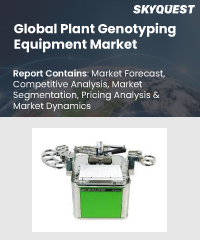
Product ID: SQMIG20I2233

Report ID:
SQMIG20I2233 |
Region:
Global |
Published Date: February, 2024
Pages:
202
|
Tables:
65 |
Figures:
80
Drivers
Increasing Demand for High-Yielding Crop Varieties:
There is a developing international populace, which has brought about an improved demand for meals plants. Plant genotyping equipment enables researchers and breeders to expand excessive-yielding crop sorts with ideal traits along with ailment resistance, drought tolerance, and stepped forward nutritional content. This driving force is pushing the adoption of genotyping tools to boost up the breeding of advanced plant sorts to satisfy the rising demand for agricultural products.
Advancements in Genomic Technologies:
Rapid advancements in genomics technologies, including subsequent-technology sequencing (NGS) and excessive-throughput genotyping structures, have made genotyping extra low-priced, green, and correct. These technological advancements have increased the programs of plant genotyping, making it easier for researchers and agronomists to conduct huge-scale genotyping initiatives. As genotyping will become greater on hand and cost-effective, it drives the increase of the marketplace.
Restraints
High Initial Investment Costs:
Plant genotyping equipment may be pricey to purchase and keep. High-first-rate genotyping equipment, which include sequencers and genotyping arrays, regularly requires a large premature investment. Additionally, ongoing upkeep and operational charges can stress the budgets of studies institutions, plant breeding corporations, and agricultural businesses. The price barrier can be a big restraint for smaller gamers within the market.
Regulatory and Ethical Concerns:
The use of genotyping gadgets in plant research and breeding may additionally enhance moral worries related to genetically changed organisms (GMOs) and intellectual property rights. Regulatory bodies in numerous countries have mounted guidelines and regulations for the use of genetically changed crops that could affect the improvement and commercialization of genetically changed plant varieties. Ethical and regulatory challenges can sluggish down the adoption of genotyping technology, in particular in regions with stringent rules or public resistance to GMOs.
Our industry expert will work with you to provide you with customized data in a short amount of time.
REQUEST FREE CUSTOMIZATIONWant to customize this report? This report can be personalized according to your needs. Our analysts and industry experts will work directly with you to understand your requirements and provide you with customized data in a short amount of time. We offer $1000 worth of FREE customization at the time of purchase.

Product ID: SQMIG20I2233